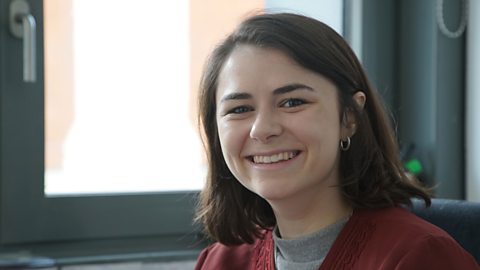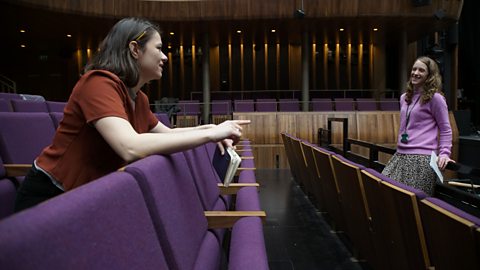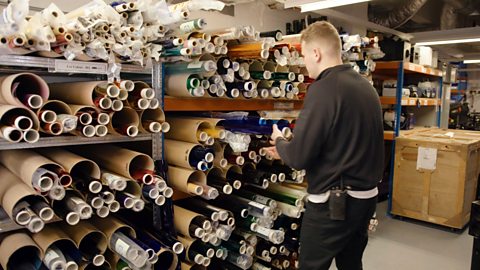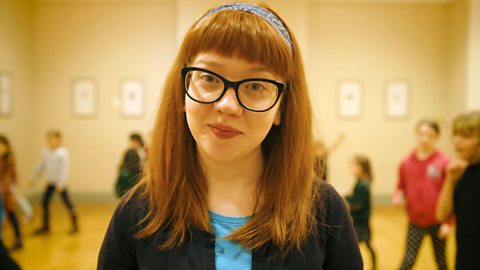Meet Mathilda, 24, from Hackney, London. Find out about her job as a production assistant at the Linbury Theatre in Central London. The theatre is one of the Royal Opera House's two stages. Part of our Bitesize world of work series.

My job is really exciting! I see the whole process of putting a production together, from the first idea to the closing night.
How would you describe your job?
I work at the Linbury Theatre and help produce operas. My job is to make sure the production process runs as smoothly as possible.
I help with casting, running rehearsals, and liaising with the artists and agents. I also take notes at our production meetings and help organise the research and development workshops that support the creation of new operas.

What skills do you use in your job?
I have to use IT skills as I work on the computer a lot. I use communication skills as I write emails every day to different artists and collaborators. I also use writing skills for putting research, proposals and programmes together.
People management skills are also key in this job. I manage different situations and different personalities. I have to be a friendly, calming, smiling face for the artists.
I definitely use teamwork skills, as I work in a team of four and we all have different backgrounds and strengths. Time management is really important too - I'm often thrown tasks from different directions and I have to be able to prioritise.

Do you draw on any of the subjects that you learnt in school?
I use the skills I learnt in my A-level Music every day as IÔÇÖm always reading the scores of our productions to understand the work dramatically and musically. I wanted to be an opera singer when I was younger. I trained as a singer which also helps me when weÔÇÖre casting because knowing about the physicality of voices is really important.
All art forms feed into each other, and the skills I learnt by doing A-level Art definitely gave me an eye for visuals and movement on stage.

Top tips
- Write to companies and see if you can have a chat with them and observe what they do - I learnt so much about what opportunities were out there this way
- Give yourself options
- DonÔÇÖt let people tell you that you can't do something. If you really want it you'll make it work.

Mathilda's job is about getting a live show ready from first idea to opening night. When the production is on, she's responsible for making sure everything runs smoothly. A similar role is a TV or film assistant production coordinator. Assistant production coordinators support producers in making film or TV programmes.
What to expect if you want to be a TV or film assistant production coordinator
- TV or film assistant production coordinator average salary: Variable
- TV or film assistant production coordinator typical working hours: 39 to 41 hours per week
What qualifications do you need to be a TV or film assistant production coordinator?
You could get into this role via a university course, a college course (such as a Level 3 Diploma or a T-level in Media, Broadcast and Production - England-only, from Sept 2023), an apprenticeship, volunteering, working towards the role, applying directly, or doing specialist courses run by private training providers.
Sources: LMI for All, National Careers Service,
This information is a guide and is constantly changing. Please check the for the latest information and all the qualifications needed and the for more on T-levels.
For careers advice in all parts of the UK visit: , , and .


Find out more
Find work experience placements with Workfinder.
Tips and advice
Help with interviews, writing a CV and all things work experience related.


Peter: lighting technician. video
Peter works as a lighting technician on live shows.

Megan: drama facilitator. video
Megan leads drama classes for children in Northern Ireland.

Vanessa: digital marketing assistant. video
Vanessa works as a digital marketing assistant for a theatre.
